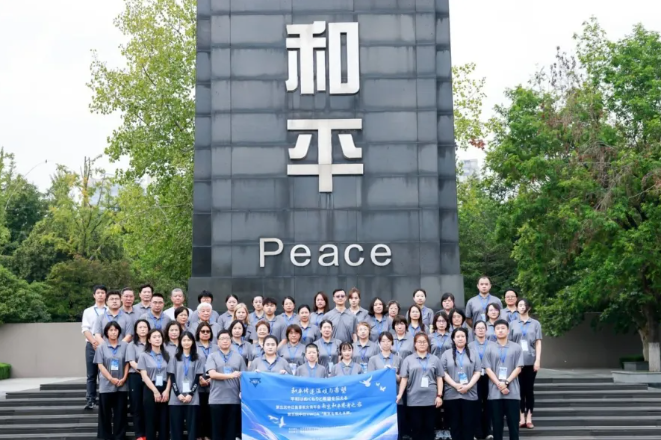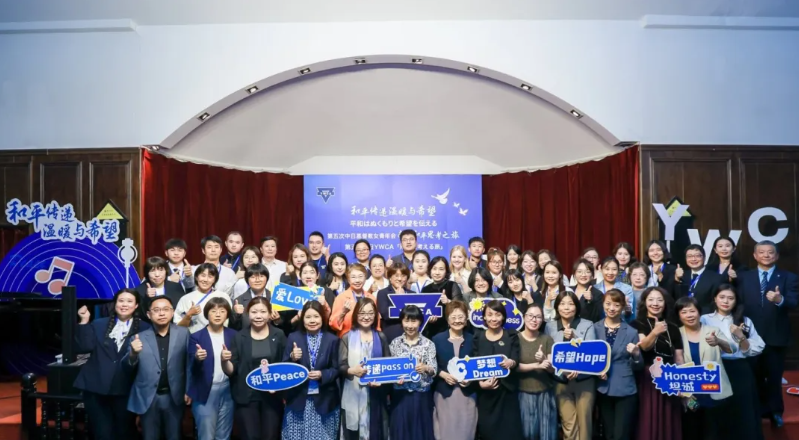The fifth Sino-Japanese YWCA "Nanjing Peace Pilgrimage" took place in Nanjing, Jiangsu, from September 21 to 25.
According to the National Councils of YMCAs and YWCAs of China, the "Nanjing Peace Pilgrimage," hosted by the National Council of YWCAs of China, has been jointly promoted by the Chinese and Japanese YWCAs since 2007 as a peace education exchange program. Centered on young people and rooted in reflection and dialogue, this year's event carried the theme "Peace Transmitting Warmth and Hope" and was attended by forty representatives from YWCAs and YMCAs in Tokyo, Yokohama, Kyoto, Nagoya, and Sapporo, as well as from various cities across China.
Marking the 80th anniversary of the victory of the Chinese People's War of Resistance Against Japanese Aggression and the World Anti-Fascist War, the YWCAs of both countries expressed hope that non-governmental forces could play a greater role in fostering friendly relations between the two nations.
Through roundtable discussions, lectures, service activities, field visits, commemorative videos, peace declarations, art, music, and other multi-generational and multi-dimensional expressions, the program highlighted the idea of "sowing hope through action." Participants were encouraged to confront history honestly while, more importantly, awakening a shared vision for the future. They visited the City of Nanjing, the Memorial Hall of the Victims in the Nanjing Massacre by Japanese Invaders, the International Safety Zone Memorial Hall, and the remains of a "comfort station."
Before the event, the Japanese delegation also engaged in exchanges with their Chinese counterparts in Shanghai on issues including women's empowerment, child development, and peace education.
A five-member high-level delegation from the YWCA of Japan visited Shanghai ahead of the "Nanjing Peace Pilgrimage." Their itinerary included visits to the Shanghai Women's Federation, the National Association of YWCAs of China, and the Gucun Town Xinjiayuan Community Cultural Activity Center of the Shanghai YWCA. Through site visits, exchanges, and discussions, the delegation gained a deeper understanding of China's current progress in women's and children's development.
On the afternoon of September 19, the Shanghai Women's Federation and the delegation held discussions on key topics such as women's empowerment, early childhood development, and family building. The delegation also reviewed the development of the YWCA of Japan since its founding in 1905—from its early efforts to support rural women migrating to cities with housing and skills training, to its postwar reflections on war and commitment to peace, to its present-day focus on supporting young women's independence and assisting women facing violence. This overview highlighted the practical direction of women's organizations in Japan.
On the morning of September 20, the delegation visited the National Association of YWCAs of China. General Secretary Gui Xiaoxin provided an overview of the organization's history, development, connections with local associations, and cooperation with the Women's Federation, as well as its role in responding to social needs, providing services, and engaging internationally. Chie Yamamoto, general secretary of the YWCA of Japan, affirmed the Chinese YWCA's service philosophy of "meeting social needs through innovation and advocacy" and shared Japan's experiences in areas such as elderly care, child and women's empowerment, and peace education. The two sides further explored thematic, project-based, and cross-border cooperation, with the goal of promoting shared progress between national and local associations and opening new channels for exchange between Chinese and Japanese city YWCAs.
During their stay, the delegation also visited the Shanghai YWCA's Gucun Town Xinjiayuan Community Cultural Activity Center, where they examined innovative community service practices and operating models and gained insight into the center's signature projects, service philosophy, and role in local governance.
Following the visit, Satoko Fujitani, chair of the Board of Trustees, and Chie Yamamoto, general secretary of the YWCA of Japan, sent a letter of appreciation for the exchange. It read, "We wish to express our profound respect and gratitude for all the efforts of every member, and we look forward to working together with the National Council of YWCAs of China in a renewed commitment of jointly planting the seeds of peace, continuing on our path towards the vision of 'Peace Transmitting Warmth and Hope.'"













